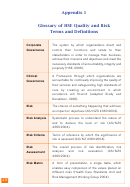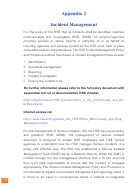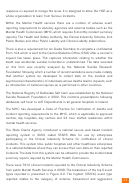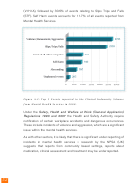Risk Management In Mental Health Services Page 38
ADVERTISEMENT
Best practice principles for assessment and management of risk to
self and others. Best Practice in Managing Risk, (DOH, 2007)
1.
Positive risk management as part of a carefully constructed
plan is a required competence for all mental health
practitioners.
2.
Best practice involves making decisions based on knowledge
of the research evidence, knowledge of the individual service
user and their social context, knowledge of the service user’s
own experience and clinical judgement.
3.
Risk Management should be conducted in a spirit of
collaboration and based in a relationship between the service
user and their carers that is as trusting as possible.
4.
Risk management must be built on recognition of the service
user’s strengths and should emphasise recovery.
5.
Risk management requires an organisational strategy as well
as efforts by the individual practitioner.
6.
Risk management involves developing flexible strategies aimed
at preventing any negative event from occurring or, if this is not
possible, minimising the harm caused.
7.
Risk management should take into account that risk can be
both general and specific, and that good management can
reduce and prevent harm.
8.
Knowledge and understanding of mental health legislation is an
important component of risk management.
9.
The risk management plan should include a summary of the
risks identified, formulations of the situations in which identified
risks may occur, and actions to be taken by practitioners and
the service user in response to crisis.
37
ADVERTISEMENT
0 votes
Related Articles
Related forms
Related Categories
Parent category: Business
 1
1 2
2 3
3 4
4 5
5 6
6 7
7 8
8 9
9 10
10 11
11 12
12 13
13 14
14 15
15 16
16 17
17 18
18 19
19 20
20 21
21 22
22 23
23 24
24 25
25 26
26 27
27 28
28 29
29 30
30 31
31 32
32 33
33 34
34 35
35 36
36 37
37 38
38 39
39 40
40 41
41 42
42 43
43 44
44 45
45 46
46 47
47 48
48 49
49 50
50 51
51 52
52 53
53 54
54








